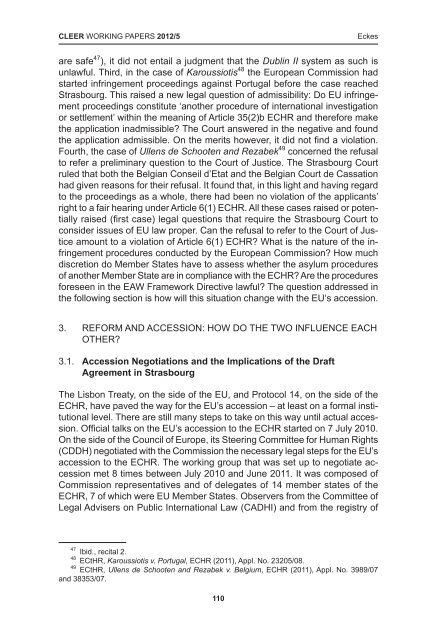CLEER WORKING PAPERS 2012/5Eckesare safe 47 ), it did not entail a judgment that the Dublin II system as such isunlawful. Third, in the case <strong>of</strong> Karoussiotis 48 the European Commission hadstarted infringement proceedings against Portugal before the case reachedStrasbourg. This raised a new legal question <strong>of</strong> admissibility: Do <strong>EU</strong> infringementproceedings constitute ‘another procedure <strong>of</strong> international investigationor settlement’ within the meaning <strong>of</strong> Article 35(2)b ECHR <strong>and</strong> therefore makethe application inadmissible? The Court answered in the negative <strong>and</strong> foundthe application admissible. On the merits however, it did not find a violation.Fourth, the case <strong>of</strong> Ullens de Schooten <strong>and</strong> Rezabek 49 concerned the refusalto refer a preliminary question to the Court <strong>of</strong> Justice. The Strasbourg Courtruled that both the Belgian Conseil d’Etat <strong>and</strong> the Belgian Court de Cassationhad given reasons for their refusal. It found that, in this light <strong>and</strong> having regardto the proceedings as a whole, there had been no violation <strong>of</strong> the applicants’right to a fair hearing under Article 6(1) ECHR. All these cases raised or potentiallyraised (first case) legal questions that require the Strasbourg Court toconsider issues <strong>of</strong> <strong>EU</strong> law proper. Can the refusal to refer to the Court <strong>of</strong> Justiceamount to a violation <strong>of</strong> Article 6(1) ECHR? What is the nature <strong>of</strong> the infringementprocedures conducted by the European Commission? How muchdiscretion do Member States have to assess whether the asylum procedures<strong>of</strong> another Member State are in compliance with the ECHR? Are the proceduresforeseen in the EAW Framework Directive lawful? The question addressed inthe following section is how will this situation change with the <strong>EU</strong>‘s accession.3. Reform <strong>and</strong> Accession: How Do the Two Influence EachOther?3.1. Accession Negotiations <strong>and</strong> the Implications <strong>of</strong> the DraftAgreement in StrasbourgThe Lisbon Treaty, on the side <strong>of</strong> the <strong>EU</strong>, <strong>and</strong> Protocol 14, on the side <strong>of</strong> theECHR, have paved the way for the <strong>EU</strong>’s accession – at least on a formal institutionallevel. There are still many steps to take on this way until actual accession.Official talks on the <strong>EU</strong>’s accession to the ECHR started on 7 July 2010.On the side <strong>of</strong> the Council <strong>of</strong> Europe, its Steering Committee for Human Rights(CDDH) negotiated with the Commission the necessary legal steps for the <strong>EU</strong>’saccession to the ECHR. The working group that was set up to negotiate accessionmet 8 times between July 2010 <strong>and</strong> June 2011. It was composed <strong>of</strong>Commission representatives <strong>and</strong> <strong>of</strong> delegates <strong>of</strong> 14 member states <strong>of</strong> theECHR, 7 <strong>of</strong> which were <strong>EU</strong> Member States. Observers from the Committee <strong>of</strong>Legal Advisers on Public International Law (CADHI) <strong>and</strong> from the registry <strong>of</strong>47 Ibid., recital 2.48 ECtHR, Karoussiotis v. Portugal, ECHR (2011), Appl. No. 23205/08.49 ECtHR, Ullens de Schooten <strong>and</strong> Rezabek v. Belgium, ECHR (2011), Appl. No. 3989/07<strong>and</strong> 38353/07.110
Accession to the ECHR as the final step <strong>of</strong> mutual recognitionthe ECtHR were present. 50 The delegates were chosen because <strong>of</strong> their personalexpertise <strong>and</strong> did not necessarily represent the position <strong>of</strong> their country.51 The working group further consulted civil society <strong>and</strong> kept the CDDH informed.The Commission representative kept both the European Parliament <strong>and</strong> theCouncil informed. 52 In several ways, the process bears similarities with theconvention method in Article 48(3) T<strong>EU</strong>, which is an attempt to combine political<strong>representation</strong> with expertise, while allowing for consultation with civilsociety. The objective could be summarized as: ‘less bargaining moredeliberation’. 53 Three draft texts were agreed in June 2011: the draft accessionagreement together with its explanatory report <strong>and</strong> the draft amendment to therules <strong>of</strong> the Committee <strong>of</strong> Ministers for the supervision <strong>of</strong> the execution <strong>of</strong> judgments<strong>of</strong> the ECtHR. 54 The Parliamentary Assembly <strong>of</strong> the Council <strong>of</strong> Europe<strong>and</strong> the two European Courts, the ECtHR <strong>and</strong> the Court <strong>of</strong> Justice, will giveopinions on the three draft instruments for accession before they are adoptedby the Committee <strong>of</strong> Ministers. 55 Finally even though the Court <strong>of</strong> Justice wasinvolved in the negotiations, it might still be formally asked under Article 218(11)TF<strong>EU</strong> to give an opinion on the compatibility <strong>of</strong> the final agreement with <strong>EU</strong>law.On a substantive level, the draft accession agreement sets out amendmentsto certain provisions <strong>of</strong> the Convention necessary to accommodate the <strong>EU</strong>’saccession. In many ways, the <strong>EU</strong> has been primus inter pares for many years,even without being a party to the Convention. It enjoys a privileged position atleast since the establishment <strong>of</strong> the presumption <strong>of</strong> equivalent protection inBosphorus, 56 which limits review <strong>of</strong> acts <strong>of</strong> the Member States implementing<strong>EU</strong> law to cases, where human rights protection at the <strong>EU</strong> level was manifestlydeficient. In other words, in the common case the ECtHR does not reviewthe compliance with the Convention <strong>of</strong> <strong>EU</strong> Member States’ acts implementing50 See list <strong>of</strong> participants <strong>of</strong> the working meetings <strong>of</strong> the working group, e.g. Annex I <strong>of</strong> CDDH(2010) 05 <strong>and</strong> 010, available at .51 J. Králová, ‘Comments on the Draft Agreement on the Accession <strong>of</strong> the European Unionto the Convention For The Protection Of Human Rights And Fundamental Freedoms’, 2 CzechYearbook <strong>of</strong> Public & Private International Law (2011) 127.52 The Council was informed through its Working Party on Fundamental Rights, Civil Rights<strong>and</strong> Free Movement <strong>of</strong> Persons. See Commission m<strong>and</strong>ate <strong>of</strong> 4 June 2010 (press release availableat ).53 A. Maurer, ‘Less Bargaining – More Deliberation: The Convention Method for Enhancing<strong>EU</strong> Democracy’, 1 Internationale Politik und Gesellschaft/International Politics <strong>and</strong> Society(2003).54 Council <strong>of</strong> Europe, Draft Legal Instrument on the Accession <strong>of</strong> the European Union to theEuropean Convention on Human Rights, CDDH-UE(2011)16, 19 July 2011, available at .55 See a summary <strong>of</strong> the process, available at . See also the ‘discussion document’published by the Court <strong>of</strong> Justice, May 2010 <strong>and</strong> Joint communication from the Presidents <strong>of</strong> theEuropean Court <strong>of</strong> Human Rights <strong>and</strong> the Court <strong>of</strong> Justice <strong>of</strong> the European Union, January 2011,available at .56 Bosphorus Airways v. Irel<strong>and</strong>, supra note 33.111CLEER WORKING PAPERS 2012/5
- Page 1:
Founded in 2008, the Centre for the
- Page 4 and 5:
CLEER WORKING PAPERS 2012/5Gosalbo
- Page 6 and 7:
CLEER WORKING PAPERS 2012/5Gosalbo
- Page 8 and 9:
CLEER WORKING PAPERS 2012/5Gosalbo
- Page 10 and 11:
CLEER WORKING PAPERS 2012/5Blockman
- Page 12 and 13:
CLEER WORKING PAPERS 2012/5Blockman
- Page 14 and 15:
CLEER WORKING PAPERS 2012/5Casolari
- Page 16 and 17:
CLEER WORKING PAPERS 2012/5Casolari
- Page 18 and 19:
CLEER WORKING PAPERS 2012/5Casolari
- Page 20 and 21:
CLEER WORKING PAPERS 2012/5Casolari
- Page 22 and 23:
CLEER WORKING PAPERS 2012/5Casolari
- Page 24 and 25:
CLEER WORKING PAPERS 2012/5Casolari
- Page 26 and 27:
CLEER WORKING PAPERS 2012/5Casolari
- Page 28 and 29:
CLEER WORKING PAPERS 2012/5Casolari
- Page 30 and 31:
CLEER WORKING PAPERS 2012/5Casolari
- Page 32 and 33:
CLEER WORKING PAPERS 2012/5Casolari
- Page 34 and 35:
CLEER WORKING PAPERS 2012/5Casolari
- Page 36 and 37:
CLEER WORKING PAPERS 2012/5Casolari
- Page 38 and 39:
CLEER WORKING PAPERS 2012/5Casolari
- Page 40 and 41:
CLEER WORKING PAPERS 2012/5Van Elsu
- Page 42 and 43:
CLEER WORKING PAPERS 2012/5Van Elsu
- Page 44 and 45:
CLEER WORKING PAPERS 2012/5Van Elsu
- Page 46 and 47:
CLEER WORKING PAPERS 2012/5Van Elsu
- Page 48 and 49:
CLEER WORKING PAPERS 2012/5Van Elsu
- Page 50 and 51:
CLEER WORKING PAPERS 2012/5Van Elsu
- Page 52 and 53:
CLEER WORKING PAPERS 2012/5Van Elsu
- Page 54 and 55:
CLEER WORKING PAPERS 2012/5Van Elsu
- Page 56 and 57:
CLEER WORKING PAPERS 2012/5Van Elsu
- Page 58 and 59:
CLEER WORKING PAPERS 2012/5Van Elsu
- Page 60 and 61:
CLEER WORKING PAPERS 2012/5Van Elsu
- Page 62 and 63: CLEER WORKING PAPERS 2012/5Van Voor
- Page 64 and 65: CLEER WORKING PAPERS 2012/5Van Voor
- Page 66 and 67: CLEER WORKING PAPERS 2012/5Van Voor
- Page 68 and 69: CLEER WORKING PAPERS 2012/5Van Voor
- Page 70 and 71: CLEER WORKING PAPERS 2012/5Van Voor
- Page 72 and 73: CLEER WORKING PAPERS 2012/5Van Voor
- Page 74 and 75: CLEER WORKING PAPERS 2012/5Van Voor
- Page 76 and 77: CLEER WORKING PAPERS 2012/5Van Voor
- Page 78 and 79: CLEER WORKING PAPERS 2012/5Van Voor
- Page 80 and 81: CLEER WORKING PAPERS 2012/5Van Voor
- Page 82 and 83: CLEER WORKING PAPERS 2012/5Van Voor
- Page 84 and 85: CLEER WORKING PAPERS 2012/5Van Voor
- Page 86 and 87: CLEER WORKING PAPERS 2012/5McArdle
- Page 88 and 89: CLEER WORKING PAPERS 2012/5McArdle
- Page 90 and 91: CLEER WORKING PAPERS 2012/5McArdle
- Page 92 and 93: CLEER WORKING PAPERS 2012/5McArdle
- Page 94 and 95: CLEER WORKING PAPERS 2012/5McArdle
- Page 96 and 97: CLEER WORKING PAPERS 2012/5McArdle
- Page 98 and 99: CLEER WORKING PAPERS 2012/5McArdle
- Page 100 and 101: CLEER WORKING PAPERS 2012/5McArdle
- Page 102 and 103: CLEER WORKING PAPERS 2012/5McArdle
- Page 104 and 105: CLEER WORKING PAPERS 2012/5McArdle
- Page 106 and 107: CLEER WORKING PAPERS 2012/5Eckeswit
- Page 108 and 109: CLEER WORKING PAPERS 2012/5Eckesdro
- Page 110 and 111: CLEER WORKING PAPERS 2012/5Eckesto
- Page 114 and 115: CLEER WORKING PAPERS 2012/5EckesEU
- Page 116 and 117: CLEER WORKING PAPERS 2012/5Eckeswil
- Page 118 and 119: CLEER WORKING PAPERS 2012/5EckesPar
- Page 120 and 121: CLEER WORKING PAPERS 2012/5Eckesthe
- Page 122 and 123: CLEER WORKING PAPERS 2012/5Eckesise
- Page 124 and 125: CLEER WORKING PAPERS 2012/5Eckesand
- Page 126 and 127: CLEER WORKING PAPERS 2012/5Eckesto
- Page 128 and 129: CLEER WORKING PAPERS 2012/5Eckesarg
- Page 130 and 131: CLEER WORKING PAPERS 2012/5Wouters,
- Page 132 and 133: CLEER WORKING PAPERS 2012/5Wouters,
- Page 134 and 135: CLEER WORKING PAPERS 2012/5Wouters,
- Page 136 and 137: CLEER WORKING PAPERS 2012/5Wouters,
- Page 138 and 139: CLEER WORKING PAPERS 2012/5Wouters,
- Page 140 and 141: CLEER WORKING PAPERS 2012/5Wouters,
- Page 142 and 143: CLEER WORKING PAPERS 2012/5Wouters,
- Page 144 and 145: CLEER WORKING PAPERS 2012/5Wouters,
- Page 146: CLEER WORKING PAPERS 2012/5Wouters,








